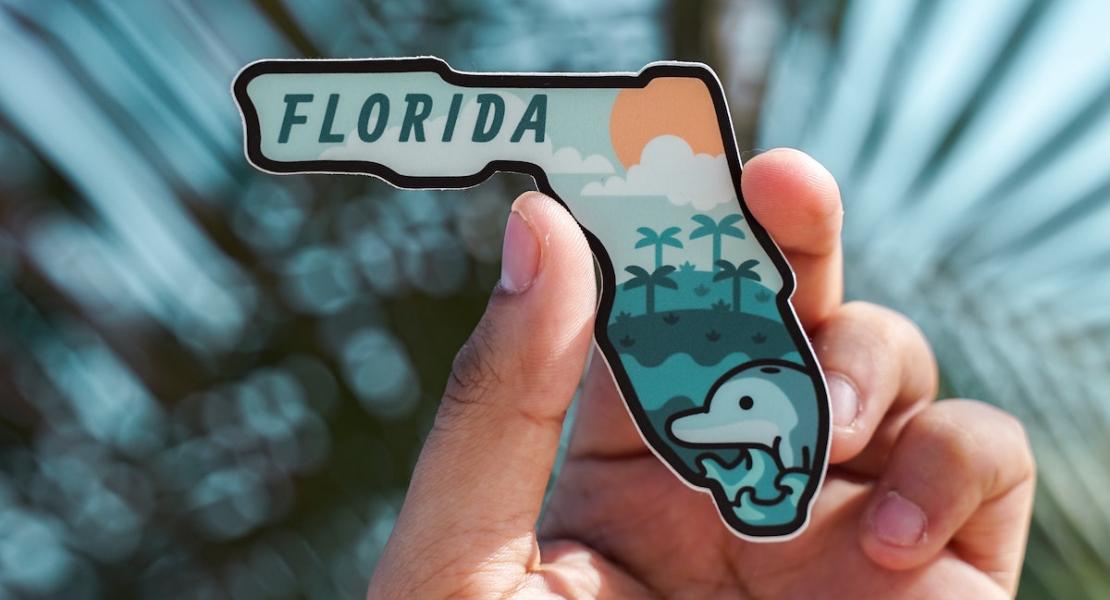
Florida state outline
Every year more and more people are moving to Florida to take advantage of not only the weather but of many of the tax benefits of being a Florida resident. A question I am frequently asked is whether their previous estate planning documents executed up north are valid in Florida. The best answer is, it depends.
A number of unexpected consequences can arise by becoming a Florida resident. Oftentimes with second marriages. In some cases properties intended to be gifted to children from a first marriage are thrown into a quandary when an individual remarries and becomes a Florida resident. Let’s pretend that Bill previously owned a beachfront condo in his sole name in Florida. A number of years ago, following his first wife's death, he remarried Susan in the state of New York. When they decided to relocate to Florida they moved into a beachfront condo that Bill had owned for years. Bill's previous estate plan was to give Susan $1 million upon his death and his children would inherit the condo valued at approximately $1 million. When Bill died his children did not receive the condo because Susan was a surviving spouse and unbeknownst to Bill and his children, despite not being on title, she had homestead rights in the beachfront property. She later met Tom and they both decided to live in the beachfront condo intended for the children for the next 20 years. This is a perfect example why individuals should re-examine their estate planning when they relocate to Florida.
I recently encountered a situation whereby the couple had their estate plan documents drafted in Minnesota. Unexpectedly, the wife needed to have surgery. When the couple went to utilize the healthcare power of attorney they previously had drafted, the doctors failed to recognize it because it was a form typically used in Minnesota. Unlike Florida, which requires this document to be notarized, Minnesota only required the document to be witnessed. Surgery was delayed one day until they could produce a compliant Health Care Directive.
In another instance, I had a client's husband develop Alzheimer’s. When it became a burden for his wife to care for him (he constantly wandered out of their house on the golf course in the middle of the night) she decided to sell the property and move back north where she would have greater assistance. She thought that the document drawn up north, which provided her with a durable power of attorney, could be used to sell the property. Unfortunately she discovered the document did not meet with the same formalities as required to convey homestead property in Florida. She discovered that the durable power of attorney she intended to use was only notarized. Unfortunately, Florida requires a durable power of attorney to be executed with the same formalities as a deed (two witnesses and a notary) in order to convey homestead property. As a result, closing was delayed six months and a guardianship was required to be set up at a significant expense just to allow her to sign off as guardian on behalf of her husband in order to sell the house.
As a result, it you decide to become a Florida resident, it is critical to have your estate planning documents reviewed. In many instances, little or no changes may be required. However, depending upon the manner in which they were drafted you could potentially run into significant difficulties.
The three most important documents to set up or have reviewed are as follows:
- An up-to-date will or an up-to-date trust. These documents will provide how assets will be distributed after a person's death. They will name the personal representative and/or successor trustee who will carry out those wishes. Unlike many other states, in Florida in order to qualify as a personal representative, the individual must either be a blood relative or a resident of the state of Florida. Oftentimes the individual listed as a personal representative or the alternate personal representative is not qualified to serve in the state of Florida. Florida also requires wills or trust to specifically set forth numerous powers that will allow the personal representative or trustee to exercise (including the power of sale of real estate) without requiring the permission of the court.
- A durable power of attorney for financial purposes. This document is critical as well as the manner in which it is executed. In the event an individual becomes incapacitated mentally and/or physically and is unable to make decisions, a durable power of attorney will select the individual to make decisions on their behalf. This is typically the spouse and then the children. It will allow people to convey real estate as well as manage investments and pay bills. A properly executed durable power of attorney is an essential estate planning document for all as incapacity could unexpectedly strike anyone as a result of an accident or illness.
- An advanced health care directive / living will. This document is critical to have and sets forth who will be entitled to access the patient’s medical records under HIPPA. It will also specify the level of care the individual wishes to receive and whether or not they wish to continue to live on life support or whether it should be terminated if they are in a vegetative state. This one document takes the burden of loved ones knowing they are following their spouses or parents wishes.